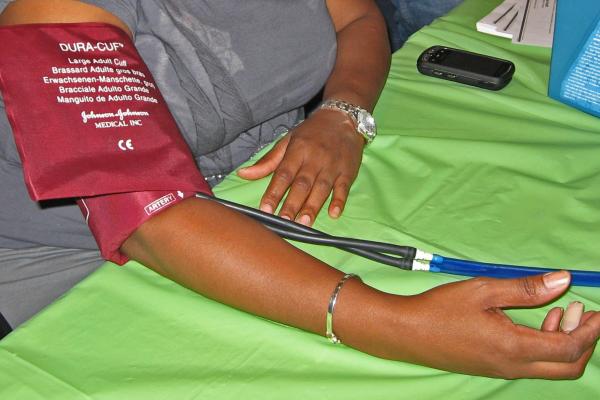
July 30, 2018 — Approximately 75 percent of black and men women are likely to develop high blood pressure by the age of 55, according to new research in Journal of the American Heart Association. This compares to 55 percent of white men and 40 percent of white women in the same age range.
The researchers identified 3,890 participants from the Coronary Artery Risk Development in Young Adults study who enrolled in the study between the ages 18 to 30 years without high blood pressure — defined as systolic/diastolic blood pressure of 130/80 mmHg or higher and who were not taking medication to control blood pressure. High blood pressure is a major risk factor for heart attacks, heart failure and strokes. The researchers found that by age 55 years:
- Seventy-five-point-five percent of black men;
- Seventy-five-point-seven percent of black women;
- Fifty-four-point-five percent of white men; and
- Forty percent of white women developed high blood pressure.
The researchers found that higher body weight was associated with an increased risk for high blood pressure, regardless of race or gender. Those who adhered to the DASH-style diet, both blacks and whites, were at lower risk for hypertension. DASH style (Dietary Approaches to Stop Hypertension) diets are rich in fruits, vegetables, whole grains, low or fat-free dairy, fish, poultry, beans, seeds and nuts, and limited in red meat and salt.
“Regardless of blood pressure levels in young adulthood, blacks have a substantially higher risk for developing high blood pressure compared with whites through 55 years of age,” said S. Justin Thomas, Ph.D., an assistant professor in the Department of Psychiatry at the University of Alabama at Birmingham. “It is urgent that healthcare providers counsel young patients, particularly blacks, about eating a healthy diet, being physically active and controlling body weight. The risk of high blood pressure can be significantly reduced with a healthy lifestyle.”
In the American Heart Association/American College of Cardiology guideline for hypertension, released in 2017, the threshold for stage 1 hypertension changed to 130 mmHg or higher for the top number or 80 mmHg or higher for the bottom number. The previous threshold for high blood pressure was at or above 140/90 mmHg. The researchers used the new definition of high blood pressure in their analysis.
“Since the definition for high blood pressure was recently lowered, it is expected that even more young African American adults will be considered to have high blood pressure,” said Thomas.
“It is important to note that most high blood pressure is preventable through lifestyle changes,” said Willie E. Lawrence, Jr. M.D., a spokesman for the American Heart Association and chief of cardiology at Research Medical Center in Kansas City, Missouri. “We need to encourage all young people, and especially our young African Americans who are at highest risk, to think about their future health and make choices that will change these statistics.”
For more information: www.ahajournals.org/journal/jaha
Reference
Thomas S.J., Booth III J.N., Dai C., et al. "Cumulative Incidence of Hypertension by 55 Years of Age in Blacks and Whites: The CARDIA Study." Journal of the American Heart Association, July 11, 2018. https://doi.org/10.1161/JAHA.117.007988


 November 12, 2025
November 12, 2025 









